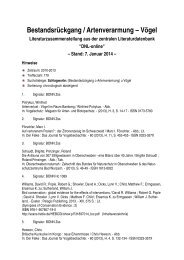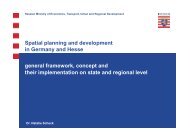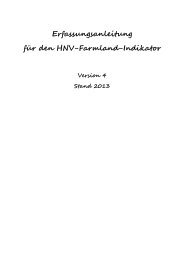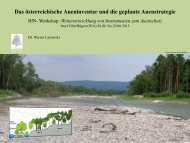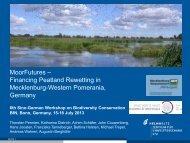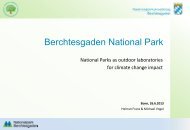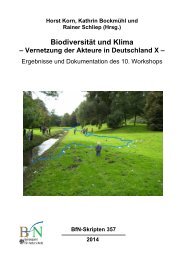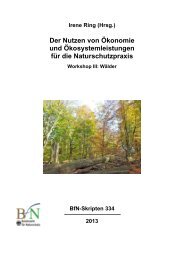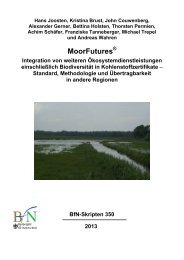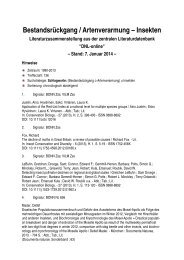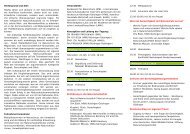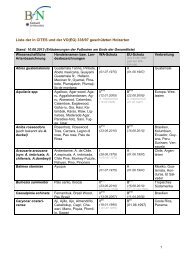Enhancing the IUCN Evaluation Process of World Heritage
Enhancing the IUCN Evaluation Process of World Heritage
Enhancing the IUCN Evaluation Process of World Heritage
Create successful ePaper yourself
Turn your PDF publications into a flip-book with our unique Google optimized e-Paper software.
Proceedings <strong>of</strong> <strong>the</strong> <strong>IUCN</strong>-WCPA <strong>World</strong> <strong>Heritage</strong> Workshop, November 2005, Isle <strong>of</strong> Vilm, Germany 23<br />
to prepare <strong>the</strong> recommendation to <strong>the</strong> <strong>World</strong> <strong>Heritage</strong> Committee on potential inscription <strong>of</strong><br />
CLs on <strong>the</strong> <strong>World</strong> <strong>Heritage</strong> List;<br />
2. ICOMOS considers greater <strong>IUCN</strong> input is essential in evaluating CLs. <strong>IUCN</strong> provides expertise<br />
that is not represented within ICOMOS;<br />
3. There is a need for stronger commitment from <strong>IUCN</strong> in general to CLs as part <strong>of</strong> its overall<br />
mission, and in relation to <strong>World</strong> <strong>Heritage</strong> in particular;<br />
4. More generally <strong>the</strong>re is a need for stronger and more integrated working by <strong>the</strong> two advisory<br />
bodies on CLs, Mixed <strong>World</strong> <strong>Heritage</strong> Sites, and <strong>the</strong> recognition <strong>of</strong> natural and cultural values<br />
within all nominations. The new integrated list <strong>of</strong> <strong>World</strong> <strong>Heritage</strong> criteria is likely to lead to an<br />
increase in <strong>the</strong> need for joint work.<br />
This working group reviewed <strong>the</strong> current process <strong>of</strong> evaluation (see diagram 1.) <strong>of</strong> CLs and noted<br />
that:<br />
1. This process is not widely understood;<br />
2. It is complicated, with a number <strong>of</strong> areas where <strong>the</strong>re is a mismatch or different expectation<br />
<strong>of</strong> different stages <strong>of</strong> evaluation. These include:<br />
• critical issues <strong>of</strong> timing <strong>of</strong> <strong>the</strong> order <strong>of</strong> work;<br />
• <strong>the</strong> production <strong>of</strong> two outputs to <strong>the</strong> <strong>World</strong> <strong>Heritage</strong> Committee (with <strong>the</strong> potential for<br />
<strong>the</strong>se to present conflicting opinions, which is a risk to <strong>the</strong> credibility <strong>of</strong> <strong>the</strong> Advisory<br />
Bodies in <strong>the</strong> eyes <strong>of</strong> <strong>the</strong> <strong>World</strong> <strong>Heritage</strong> Committee);<br />
• different formats and purposes <strong>of</strong> <strong>the</strong> reports; and<br />
• a complicated process makes <strong>the</strong> process <strong>of</strong> feedback to States Parties and evaluators<br />
difficult.<br />
Recommendations for an improved process:<br />
• <strong>IUCN</strong> should provide comments on CL nominations through ei<strong>the</strong>r a desk review - or a mission and a<br />
desk review. However it was noted that this recommendation has significant time and resources<br />
implications for <strong>IUCN</strong>;<br />
• It was noted that some CL nominations have been passed as ‘physically complete’, but are not<br />
‘conceptually complete’. Specifically, a number <strong>of</strong> nominations do not refer to <strong>the</strong> combined nature<br />
<strong>of</strong> <strong>the</strong> cultural/natural values that are <strong>the</strong> basis <strong>of</strong> a CL. Ideally this would be addressed by<br />
nominations that are not ‘conceptually complete’ being referred back to <strong>the</strong> States Parties by <strong>the</strong><br />
<strong>World</strong> <strong>Heritage</strong> Centre, and not accepted for evaluation. It was noted that this was politically<br />
difficult. As an alternative it was noted that <strong>IUCN</strong> should notify ICOMOS when a nomination lacks<br />
this discussion, which in principle should lead to <strong>the</strong> possibility <strong>of</strong> referral or deferral being<br />
recommended at an early stage;<br />
• Guidance is required from ICOMOS on <strong>the</strong> scope <strong>of</strong> <strong>the</strong> evaluation and review that should be<br />
provided by <strong>IUCN</strong>;<br />
• There is a need for <strong>IUCN</strong> to broaden <strong>the</strong> scope <strong>of</strong> its role in <strong>the</strong> evaluation process, to include<br />
providing advice on ‘managed nature’ - at <strong>the</strong> interface <strong>of</strong> man and nature. There is a need to look<br />
both within and beyond WCPA to bring toge<strong>the</strong>r <strong>the</strong> necessary expertise, for example in crosscommission<br />
bodies, such as <strong>the</strong> Theme on Indigenous and Local Communities, Equity and<br />
Protected Areas (TILCEPA), Coastal and Marine Working Group (CMWG) (alongside WCPA foci<br />
such as <strong>the</strong> Protected Landscape Task Force);<br />
• There is a small but significant body <strong>of</strong> experts active within both ICOMOS and <strong>IUCN</strong>. This provides<br />
a base on which to build a broader pool <strong>of</strong> evaluators and reviewers. Growth <strong>of</strong> WCPA membership<br />
in this area should be sought;




